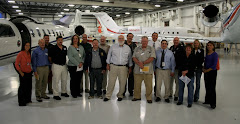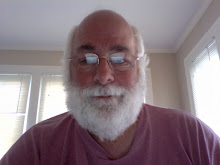| From NorwalkPlus.com LOCAL
NORWALK, CT – Sept. 29, 2009 – The Northrop Grumman (NYSE: NOC) Foundation sent 30 educators representing various school districts throughout Connecticut, Maine, New Hampshire, New Jersey, New York and Rhode Island into weightlessness today as part of the Northrop Grumman Foundation Weightless Flights of Discovery Program, which aims to inspire and prepare the next generation of scientists, mathematicians and engineers – critical areas where the U.S. has fallen behind globally. The program, in its fourth year, provides educators with a once-in-a-lifetime opportunity to prepare for and participate in micro- and zero-gravity flights during which they test Newton's Laws of Motion with a variety of planned experiments. The experience and experiment results are captured through photos and videos that the teachers will then take into their classrooms to share with their students in order to demonstrate how exciting and cool careers in science, technology, engineering and math (STEM) can be. The United States is experiencing a shortage of college graduates in the STEM disciplines, a negative trend that bodes ill for the nation’s industries that depend on talented scientists and mathematicians. Because studies have indicated most children make the decision to pursue math and science education and careers during middle-school, Northrop Grumman developed the Weightless Flights of Discovery to engage teachers, and key influencers in the lives of students during these crucial years. The Northrop Grumman Foundation supports diverse and sustainable programs for students and teachers. These programs create innovative education experiences in science, technology, engineering and mathematics. |
Wednesday, September 30, 2009
Name this CT Teacher
Friday, September 11, 2009
Thursday, September 10, 2009
Design a House
Design Studio On this Web site, you can design a house, walk through it in 3D, and then share it with the world. You can also learn more about architecture, past and present, and explore Frank Lloyd Wright's life and work.
Grant Opportunity
NAEP Draft on Technological Literacy Unveiled
A discussion draft of the framework for the national assessment of technological literacy, the first to gauge students’ understanding of and skill in using a range of tools, has been presented to the board that oversees the testing program.
The computer-based National Assessment of Educational Progress in technological literacy, scheduled to be administered to a representative sample of the nation’s 4th, 8th, and 12th graders for the first time in 2012, will evaluate students’ understanding of technology tools and their design, the ways they can be used to gather information and communicate ideas, and their impact on society.
The goal of the technological-literacy assessment should be to help students “understand all of the implications of living in a highly technological society,” said Alan Friedman, a physicist who is a member of the National Assessment Governing Board, which sets policy for NAEP. Mr. Friedman is the vice chairman of the board’s assessment-development committee.
Those implications, he said, include not only the advances to society that have been created by technology, but also the drawbacks, such as concerns about privacy, as well as the challenges society will face in the future in energy usage and other areas.
When it is made final, the framework will guide the design of the assessment. The draft defines technological literacy as the “general understanding of technology coupled with a capability to use, manage, and assess the technologies that are most relevant in one’s life, such as the information and communication technologies that are particularly salient in the world today.”
Limits to Measurement
Students may be tested on their knowledge of the kinds of tools that are available and how they are used, along with their ability to apply technological concepts to solve problems. They may be given tasks that demonstrate their ability to use various technology platforms to communicate information or collect and analyze data, evaluate information, and suggest a technology solution to a given problem.
While the assessment is meant to gauge a broad range of skills that are considered essential to technological literacy, the test design may be limited in its ability to measure some areas, the draft states, such as the habits of mind and critical-thinking skills that are considered essential to a deeper understanding and use of technology.
“This is an important development, I can say that without reservations because technological literacy is such a critical element of being a successful 21st - century citizen,” said Valerie Greenhill, the director of strategic initiatives for the Partnership for 21st Century Skills, a Tucson, Ariz.-based advocacy group. “The progression being made in the technology community away from the notion of just technology competence, such as how to use a computer, to … developing that literacy with the use of technology in daily life and in core academic subjects as well is incredibly important. To the extent that the NAEP is developing a framework that guides the development of these competencies is a welcome move.”
A number of states have implemented tests of technology or information literacy, and most have adopted the national K-12 standards in the field produced by the International Society for Technology in Education.
The NAGB committee that has been devising the framework has reviewed state technology standards, studies on assessing technology skills, and the guidelines and recommendations of ISTE and other organizations.
“We want students to understand that technology is not just computers,” said Senta Raizen, the director of the National Center for Improving Science Education, who co-chaired the framework committee. The center is based at WestEd, a research organization in San Francisco.
The goal, Ms. Raizen said at a meeting late last week where the draft was unveiled, is to understand “the human design world, where do things come from, where does our technology come from.”
She and others involved in the project say the material represented in the framework could be covered in science class, but also in subjects across the curriculum, such as mathematics, history, social studies, and language arts.
“We’ve seen movement for reading across the curriculum, writing across the curriculum,” Mr. Friedman said. “Well, technology across the curriculum makes as much sense as those do.”
Assistant Editor Sean Cavanagh contributed to this story.
Vol. 29, Issue 01
© 2009 Editorial Projects in Education




